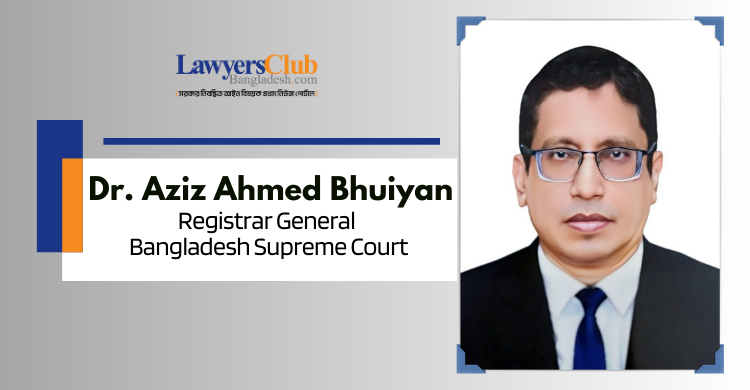Bangladesh’s Road to Democracy: Lessons from the French Revolution and the 36 July Uprising 2024

Dr. Aziz Ahmed Bhuiyan : On 14 July, the world remembers Bastille Day, marking the historic beginning of the French Revolution in 1789. The storming of the Bastille was not merely the fall of a fortress—it symbolized the people’s revolt against absolute monarchy and their demand for liberty, equality, and justice. This pivotal moment triggered centuries of legal and political transformation that laid the groundwork for constitutionalism, human rights, and the separation of powers.
More than two centuries later, in July 2024, Bangladesh experienced its own defining democratic moment—commonly referred to as the “36 July Uprising”, a symbolic term that captured the urgency and extraordinary nature of a people’s movement that spilled beyond the calendar into history. Led by students, civil society, and young professionals, the movement demanded a return to constitutional governance, judicial independence, and accountable democracy.
The French Revolution led to the Declaration of the Rights of Man and of the Citizen, establishing for the first time the idea that rights are natural, inalienable, and universal. It advanced the model of popular sovereignty, replacing hereditary privilege with the supremacy of law. It inspired doctrines of separation of powers as later articulated by Montesquieu and integrated into modern constitutions worldwide.
French Revolution: A Legal Legacy
Though separated by time and geography, the French Revolution of 1789 and the Bangladesh Uprising of 2024 are united by a shared spirit: the people’s assertion of sovereignty, and their resistance against arbitrary power.
From Bastille to Bengal: Common Struggles
The French Revolution gave birth to the Declaration of the Rights of Man and of the Citizen, asserting that:
- “All men are born free and remain equal in rights”
- “Law is the expression of the general will”
- “Every citizen may speak, write, and publish freely”
The French revolutionaries rebelled against absolute monarchy, challenged hereditary privilege, and demanded that law be supreme over any ruler. These ideals inspired constitutional governance, the independence of the judiciary, and individual freedoms principles later adopted by republics across the world.
Bangladesh’s 1972 Constitution was founded on similar ideals—democracy, equality, human dignity, and social justice. But the nation’s history has been marked by cycles of military rule, authoritarian governance, and political dysfunction. The promise of constitutional democracy has often been undermined by executive overreach, partisan judiciary, and erosion of public trust.
The 36 July Uprising of 2024 was born of this disillusionment—and of hope.
The 36 July Uprising: A Constitutional Reawakening
The July 2024 movement was not merely a protest it was a constitutional reawakening. Young people across universities, bar associations, and professional bodies came together demanding:
- Free and fair elections
- Transparent judicial appointments
- An end to digital repression and arbitrary arrests
- A judiciary free from political pressure
The name “36 July”, though beyond the calendar, symbolized how the movement extended beyond the ordinary into a constitutional reckoning. It marked the day when constitutional values broke through political paralysis. The uprising was peaceful, organized, and legally rooted, echoing the constitutional philosophy of rule of law, not rule by power.
Rule of Law vs. Rule by Law
The distinction between rule of law and rule by law became central to both the French and Bangladeshi struggles. In France, pre-revolutionary monarchs used the law to justify their own privileges. In Bangladesh, critics argue that legal instruments are sometimes weaponized to suppress dissent, silence opposition, and curtail civil liberties.
A state governed by rule of law ensures that:
- Laws are just, not arbitrary
- Justice is accessible and impartial
- Institutions operate independently
- Citizens are protected, not persecuted
The 36 July Uprising demanded the restoration of this balance urging the judiciary to assert its constitutional role and the executive to respect institutional autonomy.
Judicial Independence and Separation of Powers
The French Revolution introduced the radical notion that the judiciary must be separate from the executive and legislature an idea refined by Montesquieu. Bangladesh’s Constitution also affirms this and it has been materialized through amendment of Code of Criminal Procedure, (1898) in 2007.
The July 2024 movement specifically called for:
- A transparent and merit-based judicial appointment process has already been started through Promulgation of- [সুপ্রীম কোর্টের বিচারক নিয়োগ অধ্যাদেশ, ২০২৫
- Protection of judges from political or administrative interference
- Revival of the Supreme Judicial Council or similar independent oversight mechanisms- already started
A truly democratic society cannot exist without a judiciary that commands public confidence, and that confidence rests on the court’s independence and impartiality.
Human Rights and Democratic Legitimacy
Both revolutions were, at their heart, battles for human dignity. The French demanded the right to speak, protest, and participate in governance. The Bangladeshi people, in July 2024, raised their voices against:
- Suppression of peaceful assembly
- Digital surveillance and censorship
- Unlawful detentions and misuse of law enforcement
They demanded a return to the constitutional order where citizens, not just leaders, are sovereign.
Conclusion: The Ongoing Revolution of Conscience
The French Revolution teaches us that people’s sovereignty is not negotiable. The 36 July Uprising teaches us that constitutional promises must be fulfilled—not just written. Let liberty not be reduced to license, equality not be distorted by power, and justice not be delayed or denied.
Author Dr. Aziz Ahmed Bhuiyan, Registrar General (Senior District & Sessions Judge) of Bangladesh Supreme Court & President Chevening Society of Bangladesh (CSB) E-mail: rg@supremecourt.gov.bd / azizabrar2004@yahoo.co.uk

